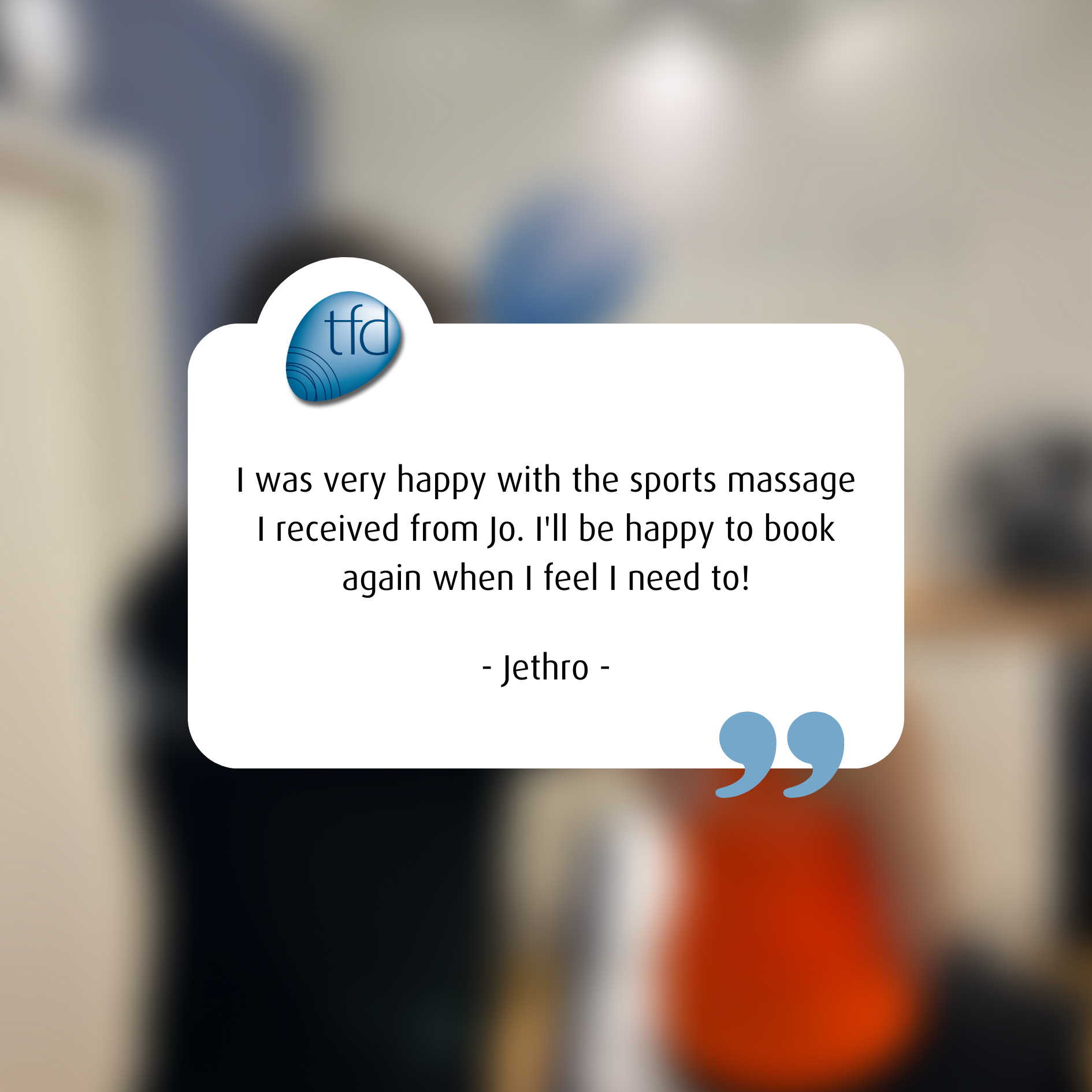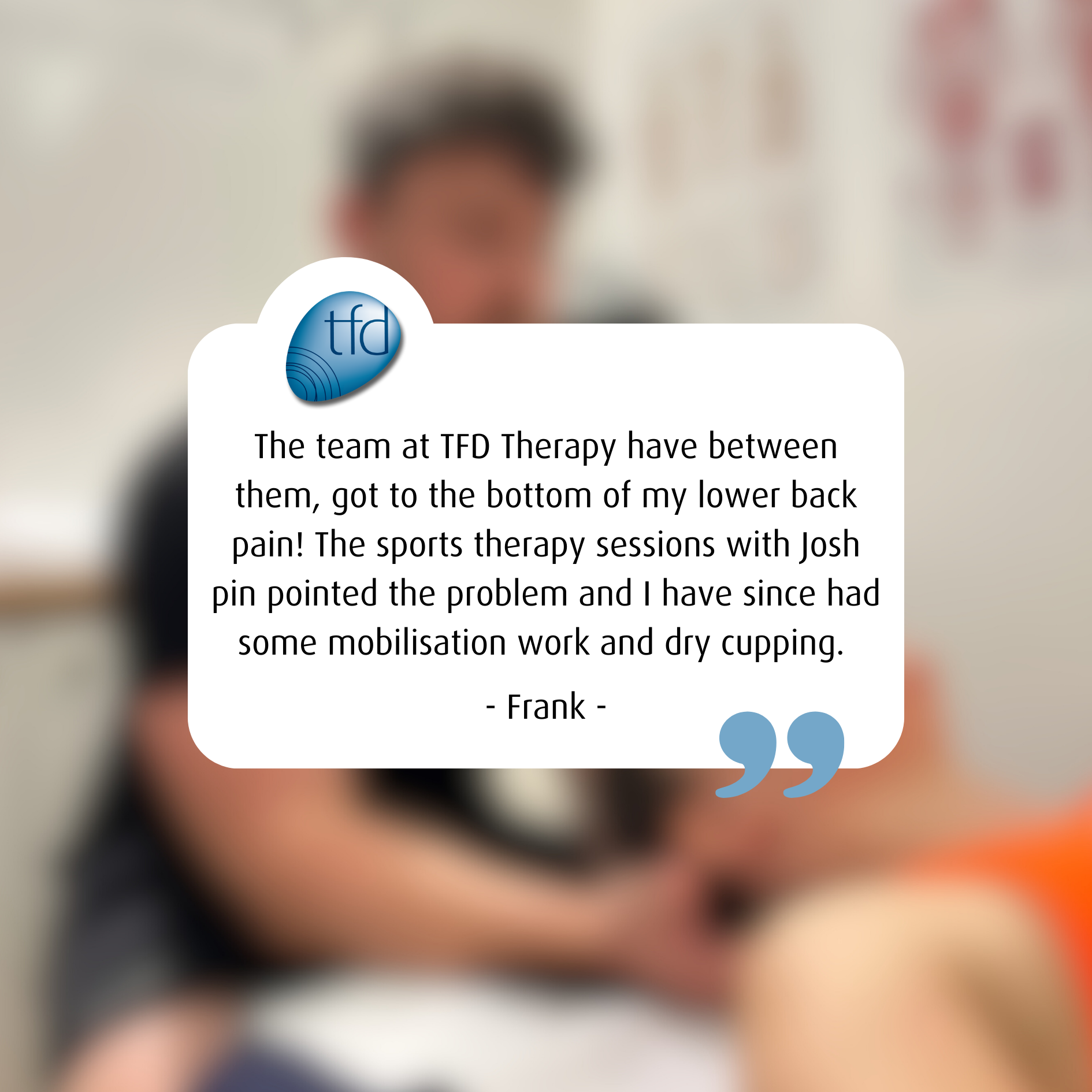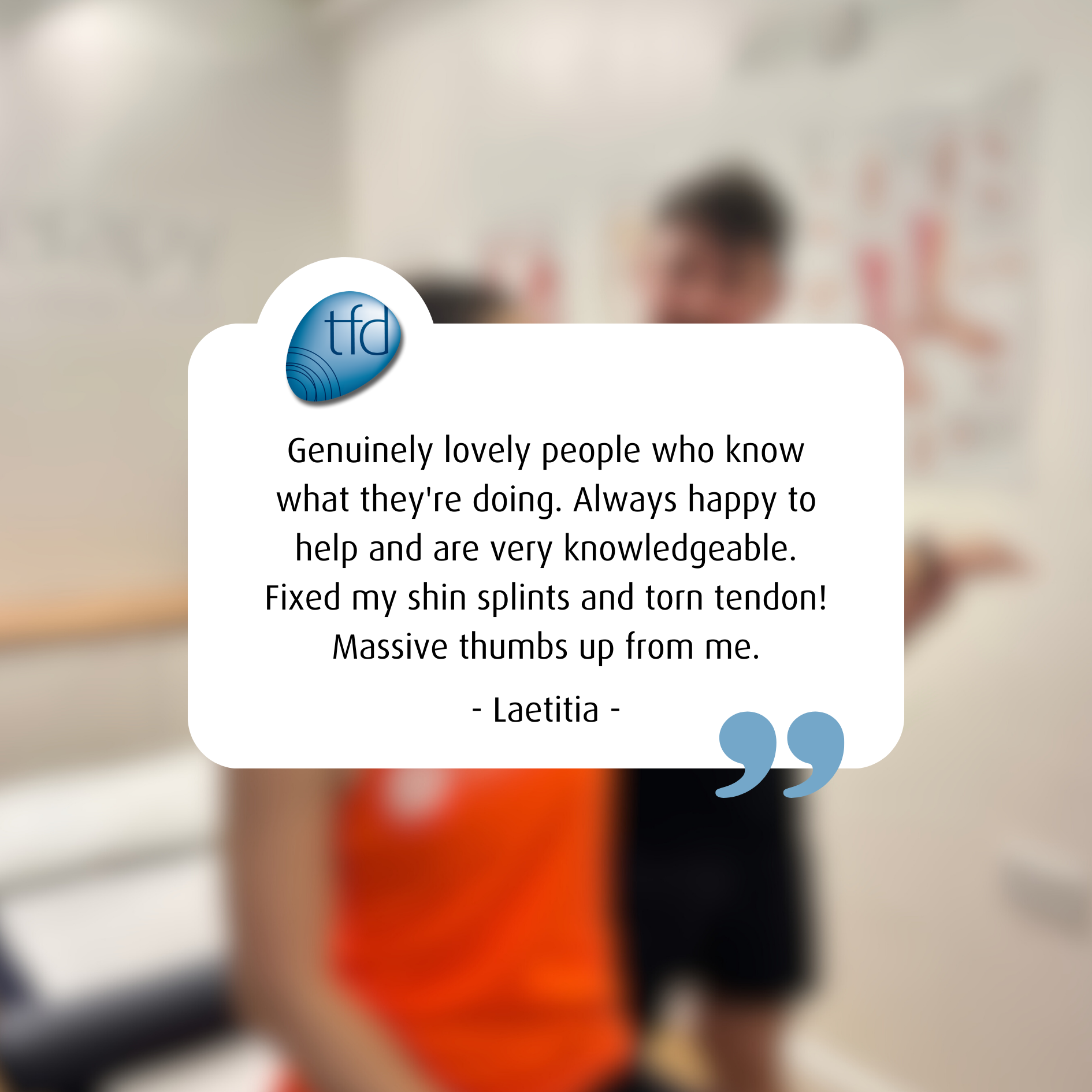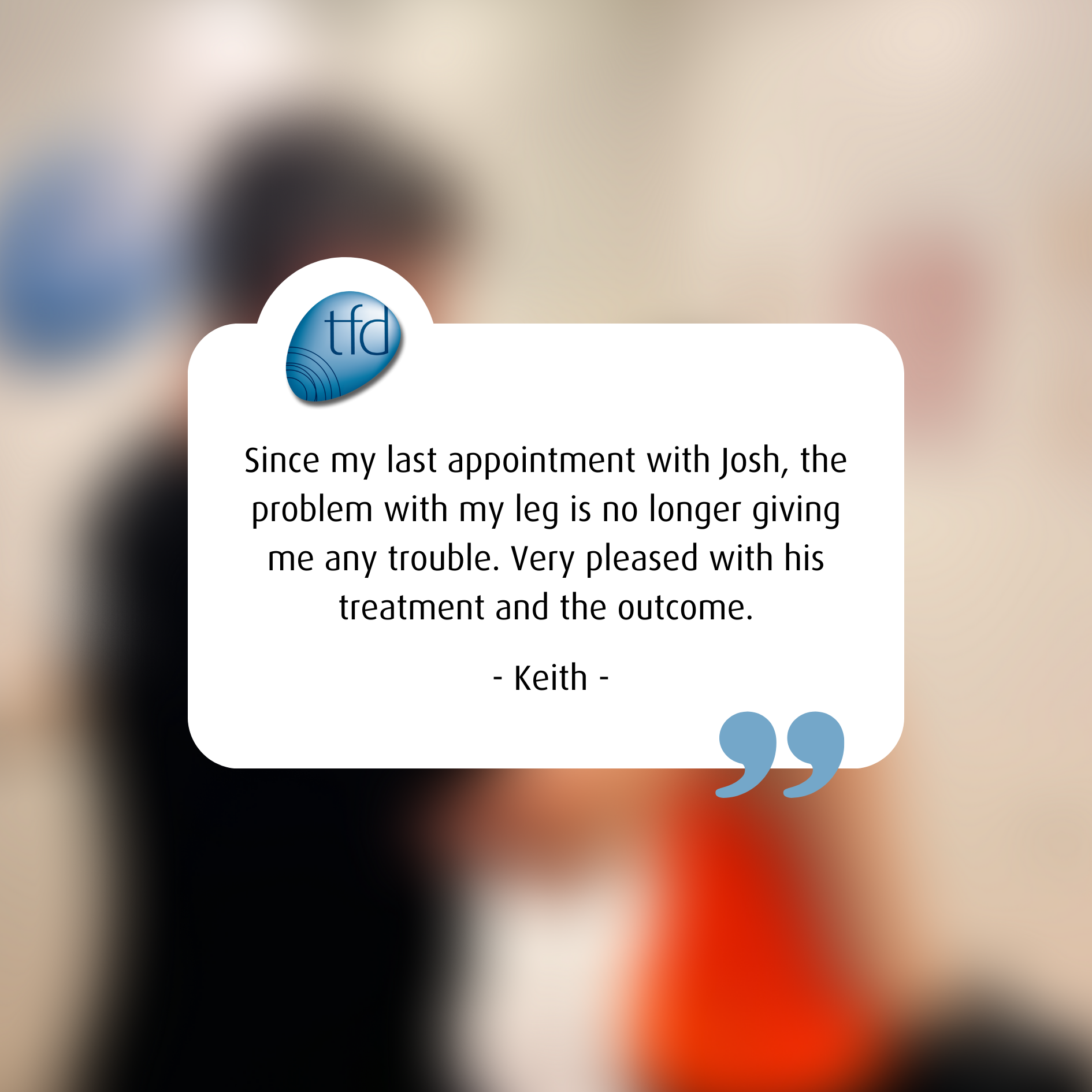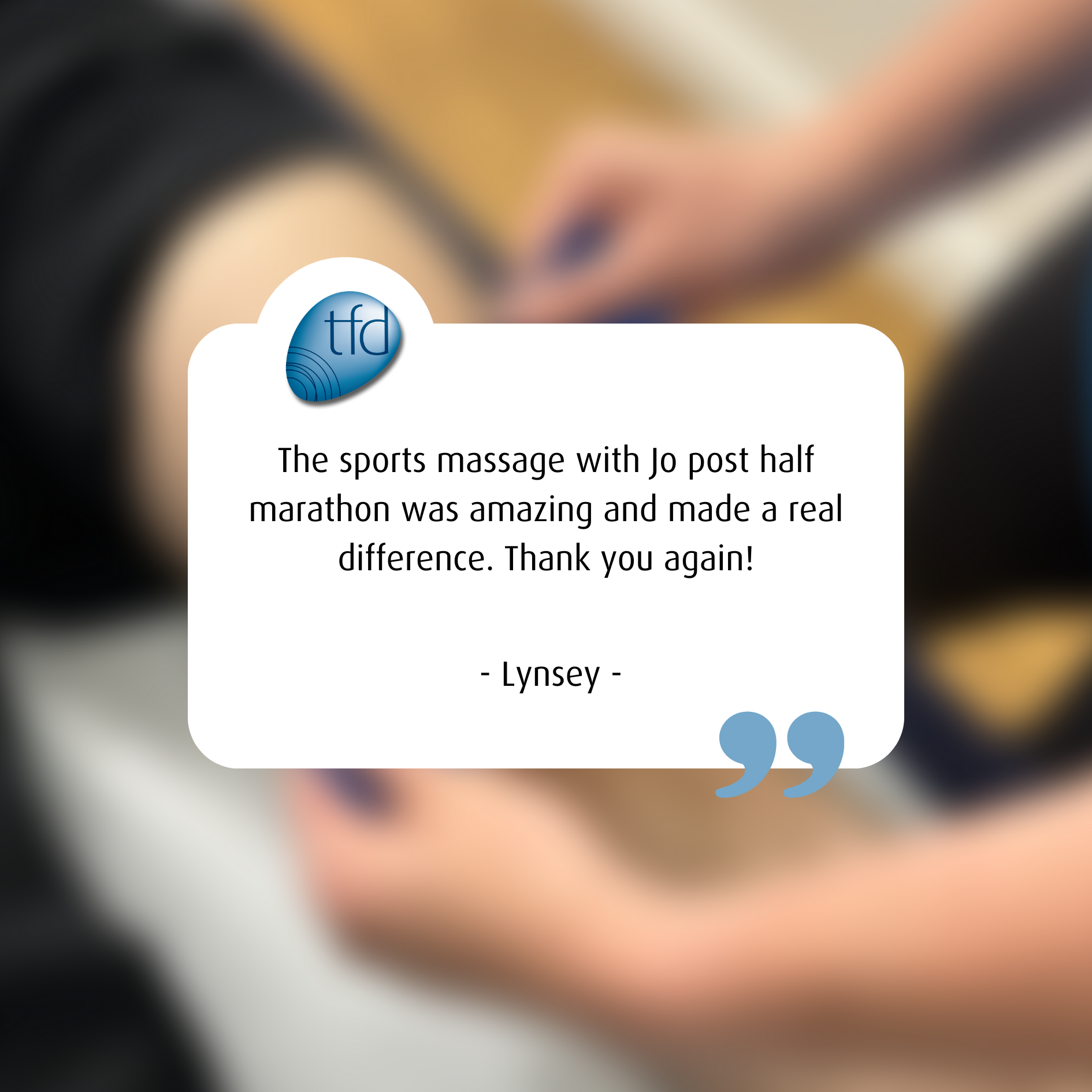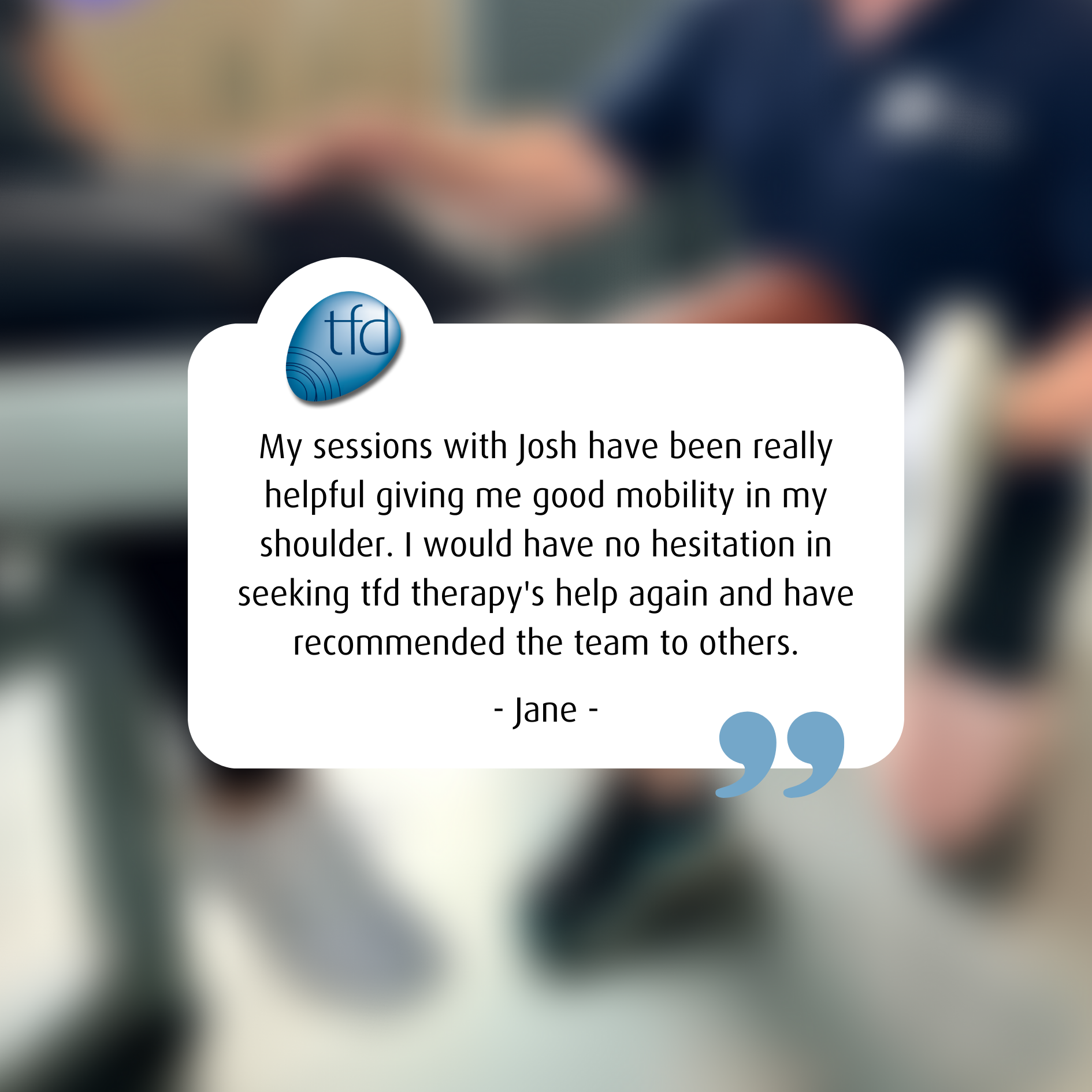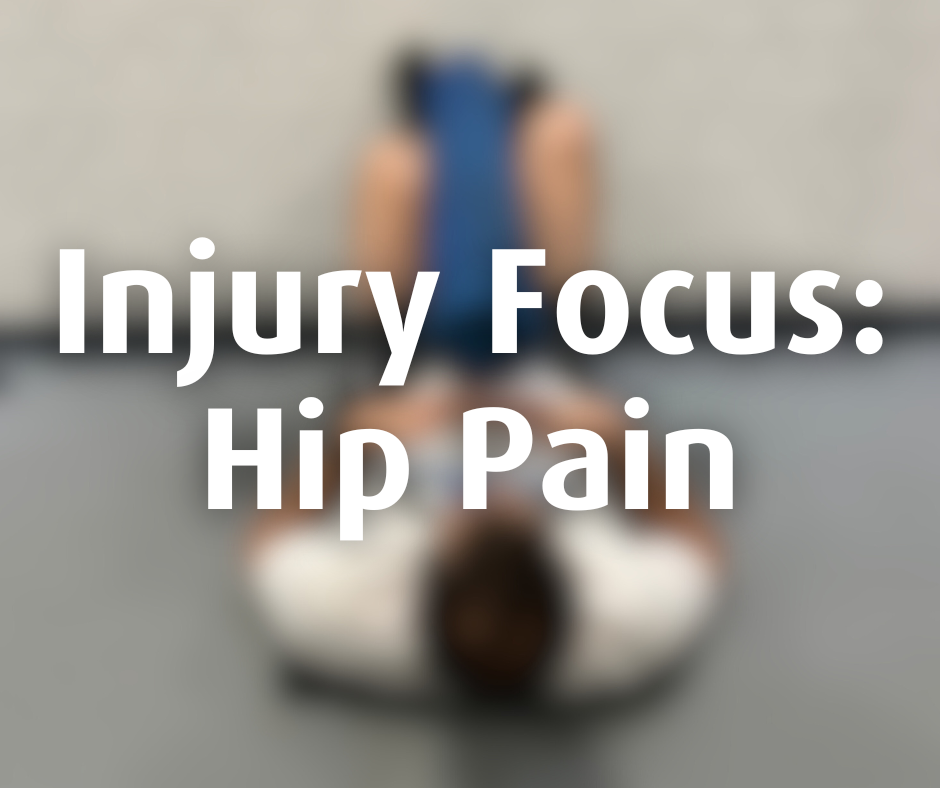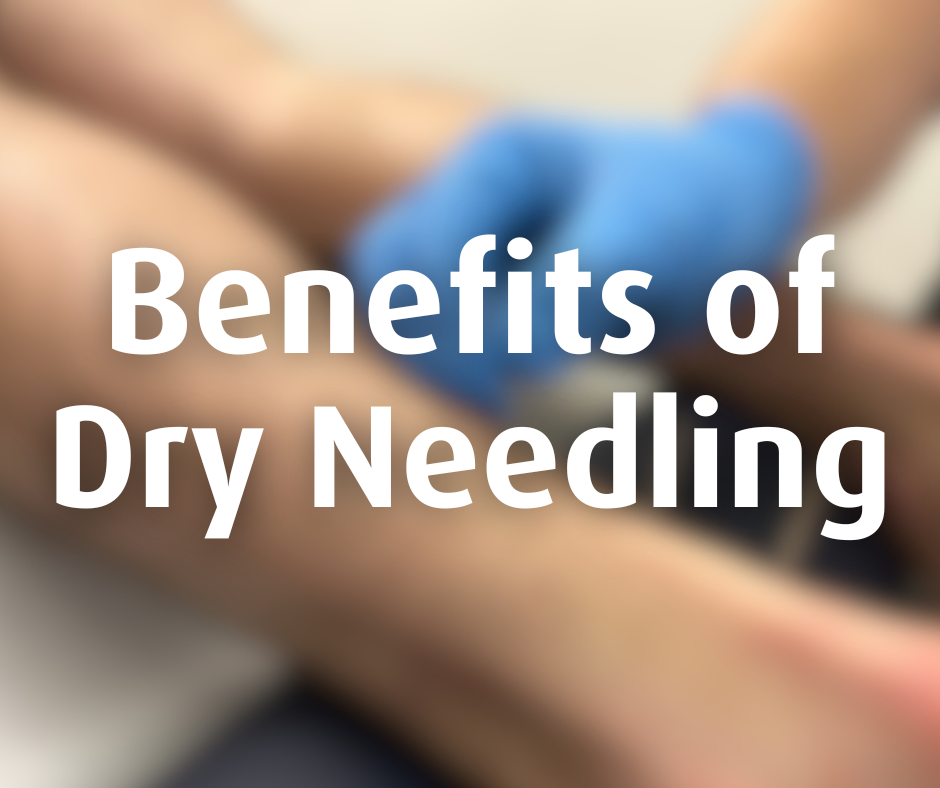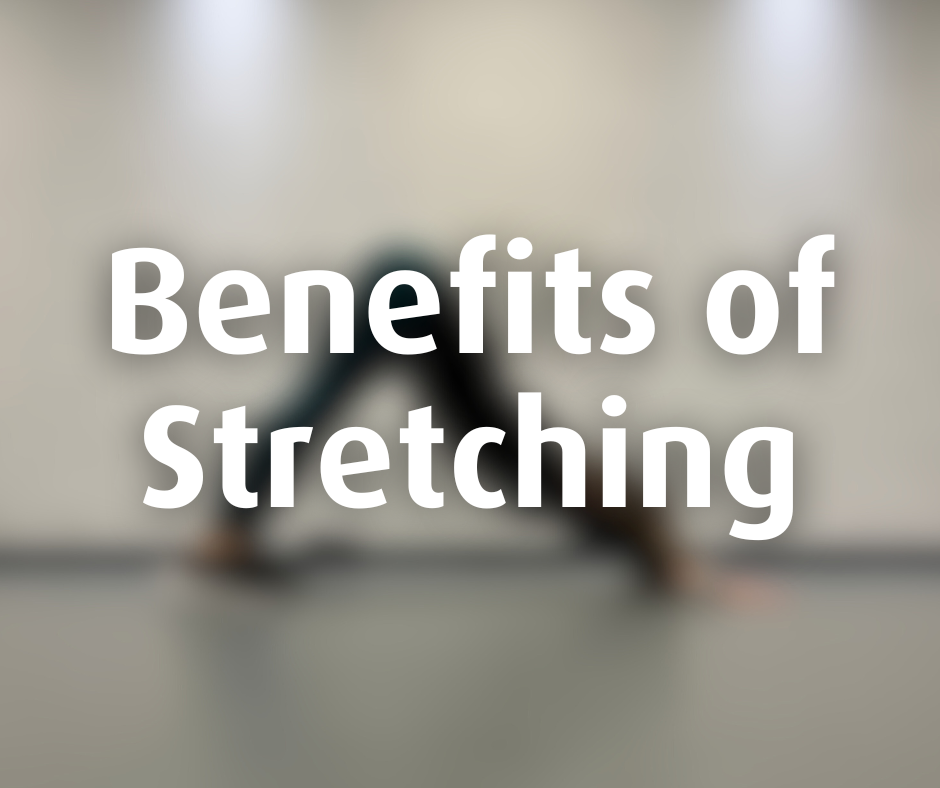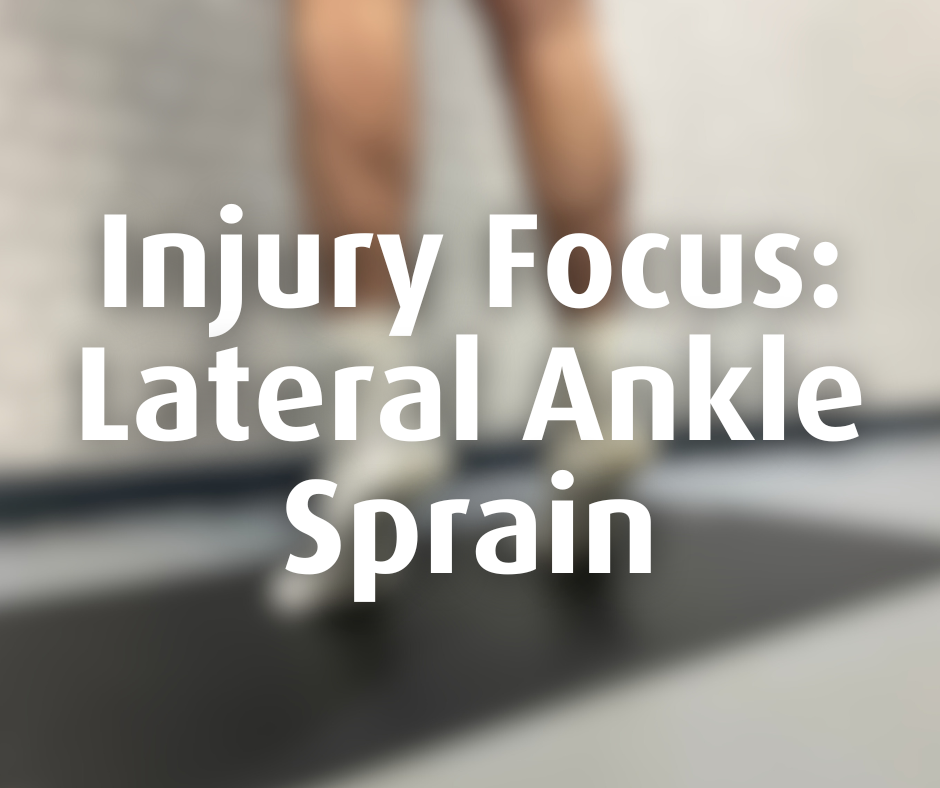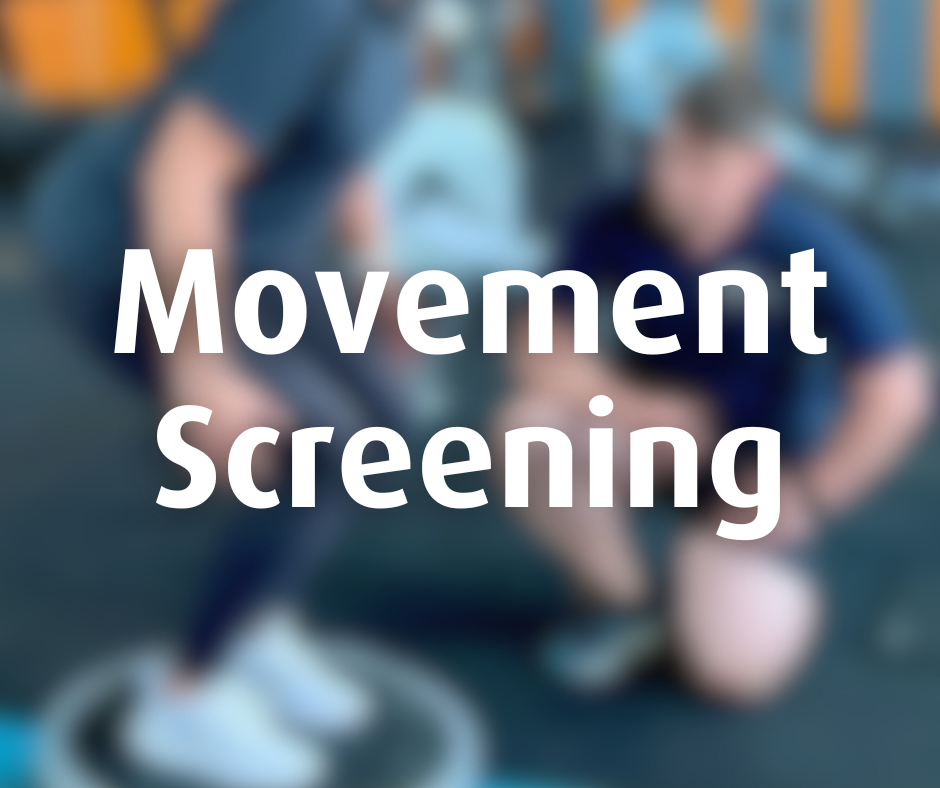Providing treatment and rehabilitation for sports and general injuries.
tfd therapy is our in-house sports injury clinic, offering sports massage and a range of sports therapies including shockwave therapy, dry needling, dry cupping and kinesiology taping. Whether you are looking for injury rehabilitation support, or to enhance your performance – our qualified therapists can advise the best course of treatment for your needs.



Soft tissue therapy involves the assessment and treatment of any soft tissue which includes ligaments, tendons, muscles and fascia.
This treatment promotes recovery from soft tissue injuries but also has a remarkable effect on posture, energy and sleep.
Read more
This treatment promotes recovery from soft tissue injuries but also has a remarkable effect on posture, energy and sleep.
Sports massage is a deep form of soft tissue mobilisation. Often used to treat tight, aching muscles that have been challenged during exercise or for maintenance to prevent injury.
Read more
When muscles are stiff, this type of massage along with some rehabilitation exercised has a positive effect in helping people become more flexible and mobile.
Sports massage prior to and after exercise can enhance performance & general wellbeing.
Shockwave is an acoustic wave which carries high energy to painful spots and myoskeletal tissues with subacute, subchronic and chronic conditions. The energy promotes regeneration and reparative processes of the bones, tendons and other soft tissues.
Read more
Shockwaves are characterised by jump change in pressure, high amplitude and non-periodicity.
Shockwave therapy is highly recommended by healthcare specialists, private health insurers and leading orthopaedic hospitals in the UK. It has become the go to treatment for injuries including Planta Fasciitis, Patella Tendinopathy, Tennis Elbow, Shoulder Pain, Heel spur, Shin Splints, Hip pain & Calcifications (Rotator cuff).



Dry needling treats muscle tissue, and its goal is to reduce pain, inactivate trigger points and restore function. It rarely is a standalone procedure and is frequently used as part of a broader physical therapy approach for injury treatment.
Read more
Dry needling can be used for a wide variety of musculoskeletal issues, such as:
- Acute and chronic injuries
- Headaches
- Neck and back pain
- Tendinitis
- Muscle spasms
- Sciatica
- Hip and knee pain
- Muscle strains
- Fibromyalgia
- Elbow pain
- PFPS (Runner’s Knee)
- Overuse injuries
As a tool for physical therapists, the use of dry needling allows for the precise targeting of deep tissues that cannot be reached by surface touch. By using the filoform needles to release or inactivate trigger points, therapists have a powerful tool to relieve pain and improve range of motion.
Dry cupping is a form of manual therapy whereby the cups are placed over several areas of soft tissue to create a vacuum (negative pressure) which lifts the tissue and creates an upward stretch within the muscle and associated fascia.
Read more
The vacuum lift helps to increase blood flow and generates a stretch effect, which results in a reduction in muscle tension and associated pain.
During Dry Cupping therapy, cups can be used in different ways. They can be placed and left in a static position, or they can be used dynamically to provide a deep tissue massage effect. Both methods of cupping therapy complement other therapy techniques such as Sports and Deep Tissue Massage, Soft Tissue Therapy and Dry Needling.
Benefits of dry cupping include:
- Cupping helps to increase the blood flow to sore areas in muscles.
- It provides necessary nutrients to the area being treated and promotes healing.
- Cupping can provide pain relief and help ease symptoms of many common disorders of the bones and muscles. It does this by exciting small nerves inside muscles so that they release pain-killing chemicals.
- Cupping Therapy helps to reduce muscular restrictions, scars and adhesions, to decrease swelling and increase range of motion.
Taping can be used alongside other treatments in the rehabilitation of injury, but can also be used on muscles or near joints as a protective measure to prevent injury during exercise and sports.
Read more
The main functions of this tape are to support your muscles, improve circulation, enabling the internal injury to heal but while still allowing motion and preventing any further damage.

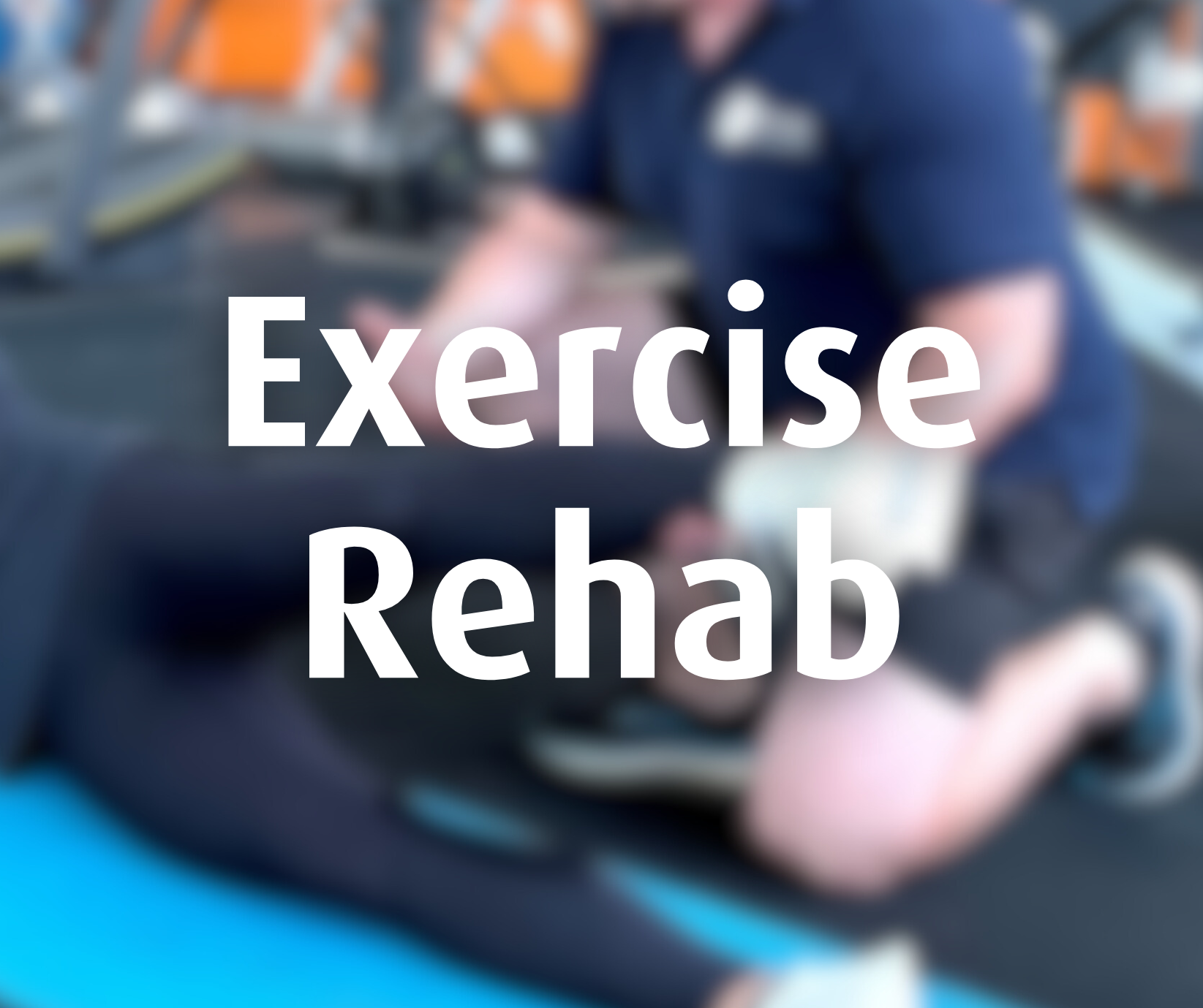

Pregnancy massage aims to reduce stress and tension during pregnancy to help make you feel good! The smooth and relaxing massage strokes promote increased blood flow and mobility as well as easing any specific tension areas you may have.
Read more
These can also be done postpartum to help you relax and to reduce any swelling.
Exercise rehab appointments are available with tfd therapy staff to aid your recovery in the gym with rehabilitation exercises that are specific to you, to help you on the way to recovery.
Read more
Bridge the gap between soft tissue therapy or sports massage treatments and have guidance with rehab exercises on the gym floor, whilst checking correct technique and posture.
A postural assessment is a visual observation method that allows you to look at a person’s overall alignment.
It can determine whether a person has any postural deviations, muscle imbalances, muscle weaknesses, or any other faults in their movement patterns which could be causing musculoskeletal pain or discomfort.
Read more
During this assessment we may assess, for example, symmetry/asymmetry and imbalances between the neck, shoulders, hips, spinal curvatures, ankle, plumb line (head to toe) as well as assessing movement patterns that mirror day to day activities, particularly if they are provocative to your symptoms.
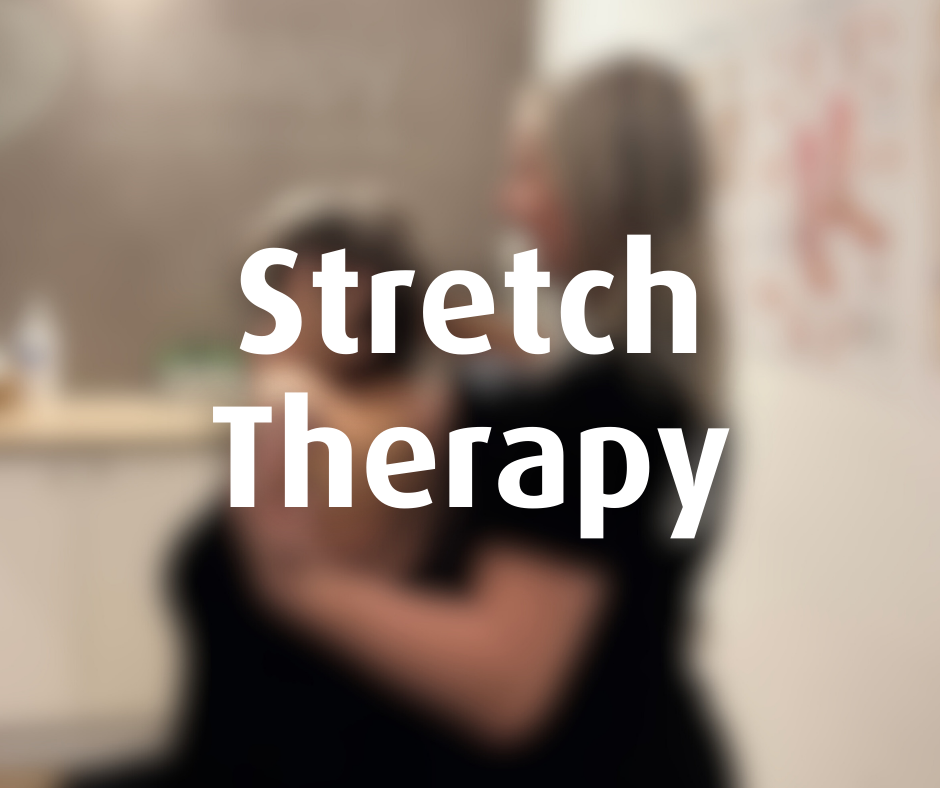

Targeted hands-on stretching techniques designed to offer a deeper and more intense stretch to relieve tension in your body helping you to feel relaxed, less restricted and more aligned.
Stretch therapy aims to improve flexibility, muscle function and range of motion and can help to alleviate muscle tension, joint stiffness and chronic pain.
Read more
It uses therapeutic techniques to get a deeper stretch than you would be able to achieve on your own and focuses on getting to the end range safely to release tension. It aims to improve general health and wellness by focusing on increasing muscle mobility and flexibility, therefore making them function more effectively.
Lymphatic drainage massage (or manual lymphatic drainage) involves the gentle manipulation of specific areas of your body to stimulate the natural drainage of the lymph system.
It encourages any excess fluid build up and toxins away from your tissues and towards lymph vessels and lymph nodes just under your skin in order to expel these from your body. It is a way of providing a natural detox and re-set for your body.
Read more
The benefits of lymphatic massage include helping to fight off infection, aids recovery post-exercise, reduces water retention, speeds up healing from flu and cold, reduces swelling, aids digestion and scar tissue healing, as well as reducing stress and fatigue.
Soft Tissue & Massage Therapy
1hr- Level 5 Soft Tissue & Sports Massage Therapists
- Josh Hatton & Jo Davies
Soft Tissue & Massage Therapy
45mins- Level 5 Soft Tissue & Sports Massage Therapists
- Josh Hatton & Jo Davies
Soft Tissue & Massage Therapy
30mins- Level 5 Soft Tissue & Sports Massage Therapists
- Josh Hatton & Jo Davies
Sports Massage
1hrLevel 3 Sports Massage Therapists
Calum Pryce & Alex Boardman
Sports Massage
45minsLevel 3 Sports Massage Therapists
Calum Pryce & Alex Boardman
Sports Massage
30minsLevel 3 Sports Massage Therapists
Calum Pryce & Alex Boardman
How to book
Pop by reception to book your appointment. Otherwise, call us on 01235 772995 or email therapy@tfdgym.co.uk
Your appointment will be confirmed once full payment has been made. Payment can be done easily over the phone or in person at reception.
Should you need to move or cancel your appointment, we are happy to do this if you give us more than 24 hours notice. Unfortunately we are unable to offer refunds or credits for missed appointments, or appointments which are cancelled with less than 24 hours notice.
Meet the team at tfd therapy...
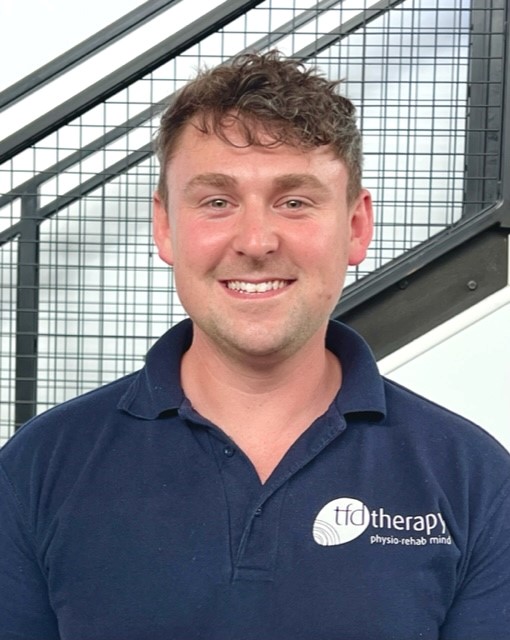
Josh Hatton
Level 5 Soft Tissue & Sports Massage Therapist
Josh has been working at TFD since March 2022. Throughout his career Josh spent nearly a decade in the emergency services as well as working as a student within the NHS.
Josh currently works as a Level 5 Sports and Soft Tissue Therapist where he treats a variety of sports and every day related injuries. Examples include lower back pain, shoulder injuries, sports related trauma, and many more. He uses a range of treatments including soft tissue, massage, dry needling, dry cupping and shockwave therapy to achieve this.
Alongside his clinical work, Josh is also a student Osteopath studying at the British College of Osteopathic Medicine. Josh is a keen rugby player as well as a runner, where he volunteers as a UK Athletics run leader for the Faringdon Far Runners Group.
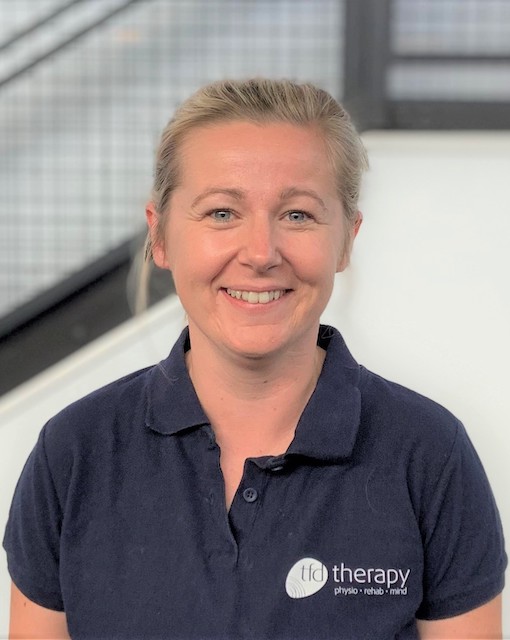
Jo Davies
Level 5 Soft Tissue & Sports Massage Therapist
Jo has been part of the tfd gym team since November 2018 as a Personal Trainer, Class Instructor and Exercise Referral Instructor. She qualified as a Level 3 Sports Massage Therapist in October 2020, before moving on to qualify as a Level 5 Soft Tissue Therapist with OSSM in 2024.
She is passionate about using Sports Therapy and Sports Massage to help people with injuries, stiffness and general aches and pains and is having excellent feedback from her clients.
Jo enjoys a variety of gym training and challenges from tough mudder and a half marathon, to trailwalker’s 100km in 24hours, and of course exploring with her cockapoo, Lily! In her spare time, she can be found watching her favourite sport speedway, either locally or on trips around the world.
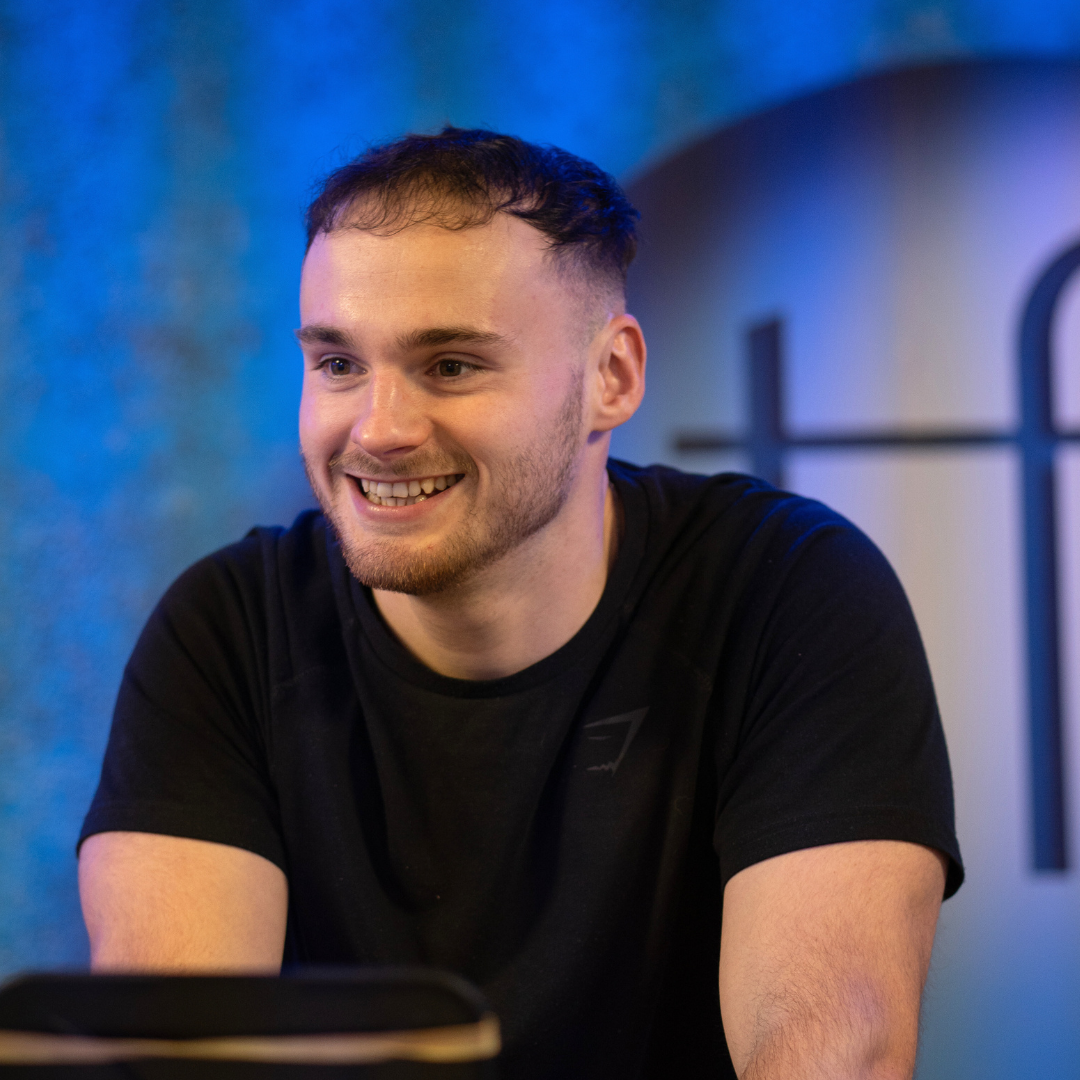
Alfie Griggs
Level 3 Sports Massage Therapist
Alfie has been part of the tfd gym team since his teens as a Fitness Instructor, Personal Trainer and Class Instructor. More recently he qualified as a Level 3 Strength & Conditioning coach and Level 3 Sports Massage Therapist.
He has had a lifelong passion for all kinds of exercise, including football and martial arts, and strength training has also been a big part of his life. Alfie is currently completing postgraduate studies in Sports Science, with a strong focus on movement and biomechanics.
With first-hand experience with injuries, this has shaped his understanding of how disruptive they can be and how effective the right therapy and rehab can feel. He is driven to help others overcome pain and injury through targeted, hands-on therapy and movement-based support.
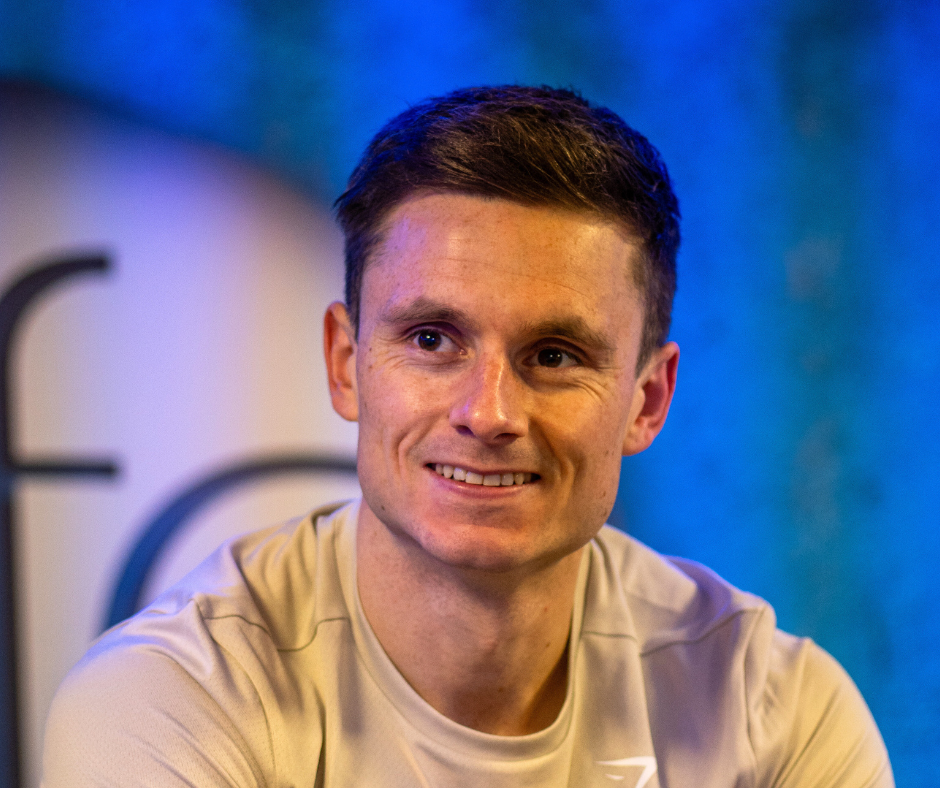
Calum Pryce
Level 3 Sports Massage Therapist
Calum has been working with the tfd gym team as a Personal Trainer and Class Instructor since 2021. He has since joined the tfd therapy team where he is available for Sports Massage Therapy, Exercise Rehab programming and Sports Injury Rehabilitation.
Calum did his BSc Strength & Conditioning degree at the University of South Wales where he specialised in functional screening and the assessment of movement patterns and posture, functional training and the technical exercises to develop fundamental movement patterns, and sports injury and rehabilitation.
Although Calum spends a lot of time in the gym, when he isn’t here, he can be found playing football for a local team and enjoys a spot of travelling when he can.

Alex Boardman
Level 3 Sports Massage Therapist
Alex joined the tfd gym team as a gym assistant in 2021 and has progressed on to complete his Level 2 Fitness Instructor & Level 3 Personal Trainer courses alongside the BTEC Level 3 National Extended Diploma in Sports & Exercise Science at the City of Oxford College. He also studied his Level 3 Sports Massage Therapy qualification during this time.
He is keen to help treat tight, aching muscles to enhance performance in the gym environment and improve general wellbeing for his clients.
Alex’s love for training and his personal nutrition, has put him in good stead for his career as a fitness professional and this has expanded his understanding of body movement and mechanics.
Our mission at tfd therapy
To find the root cause of the issue, treat using the best treatment for the problem, provide you with exercises to promote faster recovery and support you through to full recovery.
Our team of trainers at tfd gym work with Josh & Jo to give support with gym programmes and exercises to continue to build strength and mobility. With Jo being a senior member of the tfd gym team too, we have it all covered!
Related blog posts
Nov 6, 2024 | TFD Therapy
Oct 24, 2024 | TFD Therapy
Oct 9, 2024 | TFD Therapy
The hip joint is one of the most vital components of our musculoskeletal system, playing a critical role in our ability to walk and run. Structurally, the hip joint is a ball-and-socket joint, where the head of the femur (thigh bone) fits into the acetabulum, a socket…
Read more
Despits its growing popularity, many people are still unfamiliar with what dry needling entails and how it can benefit them. This blog will provide an in-depth look at dry needling therapy, covering what it is, how it works, the benefits of it and the conditions it…
Read more
Stretching is a physical exercise responsible for improving range of motion and flexibility as it lengthens and elongates muscles. Alongside improving flexibility, there are many additional benefits to stretching of which we highlight below: Improved…
Read more
Sep 25, 2024 | TFD Therapy
Sep 11th, 2024 | TFD Therapy
Sep 3, 2024 | TFD Therapy
Hands up if you’ve ever had an ache, pain or niggle? Almost everyone, right? Hands up if you’ve ever tried to continue training through an injury because “it’ll go away by itself”? Again, too many hands up. Hands up if injury prevention methods are something…
Read more
Ankle sprains are common injuries. Around 85% of them involve the outer (lateral) side of the ankle. These are called lateral ankle sprains. Lateral ankle sprains usually happen when the ankle turns inward upon landings, but other movements such as rotating…
Read more
Movement screening is a comprehensive assessment tool used by fitness professionals, physiotherapists, and sports coaches to evaluate an individual’s fundamental movement patterns. It involves a series of standardised tests designed to identify imbalances,…
Read more
Click here for more…

